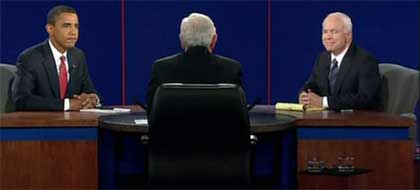
Wednesday's third and final presidential debate of the 2008 election campaign was something we haven't seen this year, or in many previous election cycles. This debate, in both structure and execution, was... an actual debate.
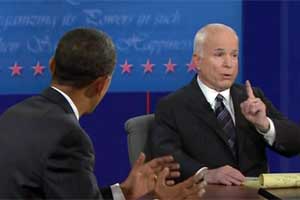
Instead of being anchored at their respective podiums or strolling around like free-range politicians, John MCain and Barack Obama last night sat still, and sat close to one another. Across the same table from moderator Bob Schieffer of CBS, they fielded questions -- but with plenty of time left over for follow-ups and interaction.
Schieffer was fabulous. Questions were short and to the point, and he came back to them if either candidate ignored or deflected them. The economy. Health care. Appointing Supreme Court candidates. Education. The conduct of their own presidential campaigns. Important or defining questions all, and ones that allowed both candidates to repeat and amplify their positions.
But in the follow-up portion after each question, this final debate also allowed candidates to question or refute the statements of the other. "Facts" established by one man often were swatted away by another. Charges that sounded persuasive and damaging, at first, were explained away even more persuasively by the other.
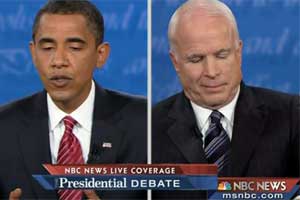
It was a debate where the use of split-screen, for the first time, was invaluable, as exchanges often led to both men exchanging brief comments, or waiting impatiently to have their turn. It also was another example of presidential proxemics, as candidates decided when to look at each other, when to address Schieffer, and when to stare directly into the camera and address America.
"Joe the plumber," an Ohio citizen whom McCain referenced, by the count of NBC's Chuck Todd, more than 20 times, was the catch phrase of the night, eventually addressed directly by both McCain and Obama. Perhaps we now know what the previous working-class symbol, "Joe Six-Pack," does for a living. Or perhaps it's a different Joe entirely. Either way, he came close to getting more air time last night than Schieffer.
It was a great debate -- not for fireworks, but for actually being worthwhile, respectful of the process, and reflective of the seriousness of a race for the presidency. Afterward, NBC's Tom Brokaw, who moderated the previous debate, called it "easily the most personal and emotional" of this year's face-offs. I would add that it also was easily the most mature, impressive and informative.
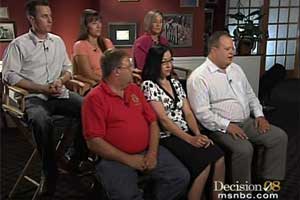
Of course, not everyone will agree. Opinions are all over the map, and all over TV -- sometimes instantly. I won't even watch a debate on CNN any more, because its live dial-an-opinion graphic is so incredibly annoying and distracting. Also infuriating are those instant after-the-fact interviews with a representative sample of undecided voters, asking what they think.
You know what? When air time is this precious, and the issues this important, I don't care what they think. Not right after the candidates have spoken, anyway. The networks have highly paid people who are political experts, thoughtful historians, veteran journalists -- use them, damn it. If not now, when? When Ann Curry asks these undecided voters their opinions of the debate they've just watched, and some of them say they're undecided, I want to scream. And do. And then I change channels.
I, on the other hand, am completely decided.
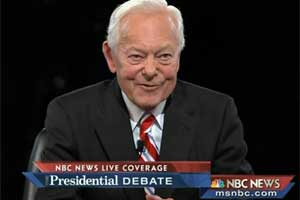
I've decided that last night's debate format should be the template for all future ones, unless someone proposes something even better. I've decided that Bob Schieffer has shown just how to moderate a debate, and should be just as strong a model for future aspirants to that position.
And finally, I've decided that Schieffer's closing remarks, quoting his own mother, should be remembered, and embraced, by everyone.
"Go vote now," he recalled her saying to him many years ago. "It'll make you feel big and strong."